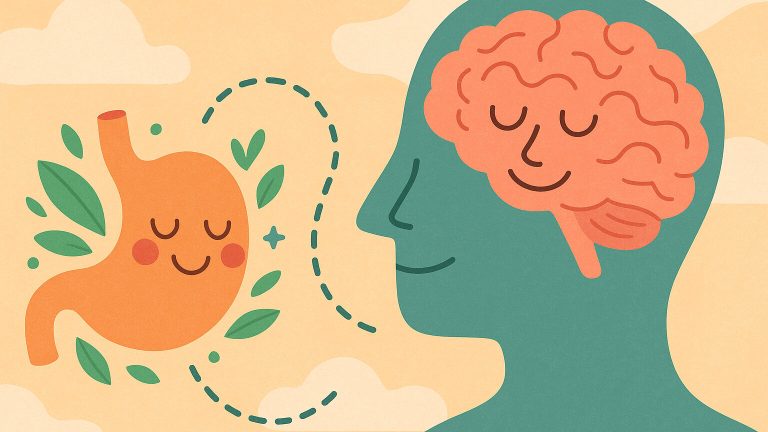Why the Gut Has More to Say Than You Think
Many people think of the gut as just a part of digestion. But there’s a growing awareness that it plays a deeper role in how we feel each day. From stress to sleep and mood, the gut is more connected to our mind than we may realize. This connection is often called the gut-brain axis, and it’s turning into a topic of genuine interest for those looking to improve their mental wellness naturally.
People who have faced anxiety or low mood sometimes notice changes in how their stomach feels. There might be bloating, discomfort, or irregular digestion. While this seems like a coincidence at first, it often isn’t. That’s because the gut and brain actually talk to each other through signals, including hormones and nerves. When this communication works well—especially when there is a healthy Gut Microbiota Balance—it supports emotional balance. But if something goes off track in the gut, the effects can show up mentally too.
Understanding the gut’s influence on mental well-being can open new doors for self-care. It’s not only about food choices. It’s about daily habits, stress levels, and how we treat our bodies. And the good news is that even small changes in gut health can make a big difference in how a person feels mentally.
The Gut-Brain Connection in Simple Terms
There’s a highway of communication between your gut and your brain. It works both ways—your brain sends signals to your gut, and your gut sends signals back. This system includes the vagus nerve, which acts like a direct phone line between the two. When your gut is calm and working smoothly, your brain tends to feel better too.
Another important part of this link is something called the microbiome. It’s the collection of tiny organisms—mostly bacteria—that live in your gut. These microbes do a lot more than help break down food. They create compounds that affect mood, such as serotonin. In fact, a large part of the body’s serotonin is produced in the gut, not the brain.
When the microbiome is healthy, it helps regulate inflammation, stress responses, and energy levels. But if it’s thrown off balance, the body can react in ways that affect thinking and emotions. That’s why keeping this system in balance matters for more than just physical health—it helps support emotional stability too.
How Diet Impacts Mood Through the Gut
What you eat affects how you feel. That idea isn’t just about weight or energy anymore. It’s also about mental clarity and emotional balance. When people eat foods rich in fiber, healthy fats, and natural probiotics, they’re feeding their gut the tools it needs to support the brain.
For example, fermented foods like yogurt or kimchi can introduce helpful bacteria to the gut. Leafy greens and fruits provide fiber that feeds those bacteria. Together, they support a gut environment that’s linked to fewer mood swings and more consistent energy.
On the other hand, a diet full of processed food, sugar, and artificial ingredients can lead to inflammation. This inflammation doesn’t just stay in the stomach—it can send signals to the brain that make it harder to focus or feel calm. People often feel the difference within weeks of making changes to their meals.
Stress Starts in the Mind but Impacts the Gut
Many people notice digestive problems during stressful times. That’s not just nerves—it’s a real reaction happening inside the body. Stress causes the body to release chemicals like cortisol. These can change how the gut works, slowing down digestion or making it speed up in uncomfortable ways.
Chronic stress also changes the gut bacteria. It can make the balance shift in favor of bacteria that aren’t helpful, while the good ones shrink in number. Over time, this shift can lead to more inflammation and even impact how well nutrients are absorbed from food.
One common example is how people under pressure often experience stomach cramps or lose their appetite. These are signs that the gut-brain conversation isn’t going smoothly. Managing stress with habits like deep breathing, regular sleep, and exercise can help calm the gut and improve mood over time.
Signs That Gut Health May Be Affecting the Mind
There are many signs that the gut and mental health are connected. Some are clear, like stomach discomfort and mood changes happening together. Others are more subtle—like fatigue that doesn’t go away, trouble sleeping, or a foggy head.
For example, someone might feel down and also notice more bloating than usual. Or they might have anxiety and find that certain foods upset their stomach. These aren’t always just coincidences. They can be clues that the gut needs more care.
It’s worth paying attention to how emotional shifts and digestive changes appear together. Tracking meals and moods for a few weeks can reveal patterns. With that information, people can try gentle shifts—like changing their diet or reducing stress—to see if it brings relief.
Simple Ways to Support Both Gut and Mind
Daily habits make a big difference. One way to support both gut and mind is by building meals around whole foods—think colorful vegetables, whole grains, and fermented items. These feed the gut and help it send calm signals to the brain.
Staying hydrated also matters. Water helps move things through the digestive tract and supports clear thinking. Sleep is another key factor. When the body gets rest, the gut can reset and perform its job better, which in turn benefits emotional balance.
Physical activity adds to the cycle of good gut and mental health. It helps reduce stress and improves circulation. Even a 20-minute walk can support digestion and give the mind a mental lift. These simple actions, done consistently, can strengthen the gut-brain link over time.
The Role of Probiotics and Prebiotics in Mental Balance
Probiotics are living organisms found in some foods and supplements. They help restore the natural balance of bacteria in the gut. Prebiotics, on the other hand, are fibers that feed these bacteria. Together, they form a powerful team for supporting gut and mental health.
Yogurt, kefir, sauerkraut, and miso are examples of foods with probiotics. Foods like bananas, onions, and oats offer prebiotics. Adding these to meals can help the gut work more efficiently, leading to better mood control and less stress-related fatigue.
People who take probiotics often notice changes in their digestion first, but over time, they may also find they sleep better or feel less anxious. That’s the gut-brain connection in action—working silently behind the scenes to support emotional well-being.
Medication, Gut Health, and Mental Side Effects
Some medications affect the gut and, in turn, mental wellness. Antibiotics are a clear example—they can wipe out both harmful and helpful gut bacteria. After a course of antibiotics, people sometimes feel more tired, moody, or mentally cloudy. This can be due to changes in their microbiome.
Other medications, like certain antidepressants or painkillers, can also change digestion. They might slow down the gut or create discomfort. These side effects can then circle back to affect mood, creating a feedback loop that’s hard to break without attention to both gut and brain.
Talking to a health provider about how medications affect digestion can be a helpful step. Sometimes small adjustments—like adding probiotics during or after a treatment—can make a big difference in supporting both gut comfort and emotional stability.
Personal Stories That Highlight the Gut-Mind Connection
Many people notice a shift in how they feel mentally once they start focusing on their gut health. One person might recall how switching to a plant-rich diet improved not just digestion but also their ability to handle stress. Another might share how adding probiotics helped with anxiety during a busy time.
Stories like these make the science feel real. They show that caring for gut health isn’t only about digestion—it’s a step toward feeling better emotionally too. These stories often start with small changes and grow into larger habits that bring lasting benefits.
Sharing these experiences also helps others realize they’re not alone. Many people are on the same journey of connecting their gut to their emotional well-being. It creates a sense of community and support that’s rooted in everyday choices.
The Everyday Choice That Shapes Mood
The link between gut health and mental wellness isn’t just for scientists or doctors to talk about. It’s something that shows up in the meals we eat, how we handle stress, and how much rest we give ourselves. It’s something anyone can work on, one day at a time.
By caring for the gut with attention and small changes, people can build a stronger base for emotional stability. Whether it’s through food, movement, or rest, these decisions support a better mood and a clearer mind. It’s not about perfection—it’s about progress that feels manageable and personal.
Over time, these everyday choices form a rhythm. They shape how a person feels and responds to life. And while it may not happen overnight, the reward is a more grounded, calm, and balanced state of being—thanks to the quiet power of a healthy gut.




